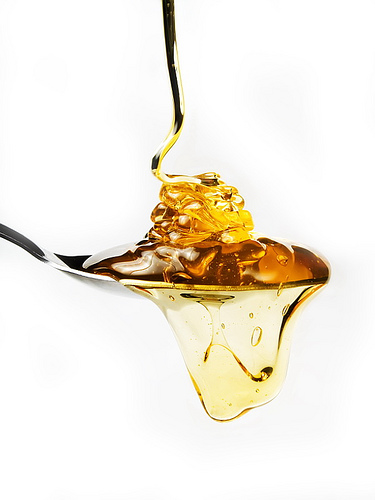Refined and Pasteurized Honey
The vast majority of brands of honey in most grocery stores are refined and pasteurized – these brands provide little more than liquid sugar.
Nectar commonly contains about 20 to 40 percent sugar. The bees in the hive concentrate the honey in the honeycomb to about 83% solids. Bees add the enzyme invertase to convert sucrose to the simple sugars glucose and fructose. After collection, most honey is heat treated. Honey is also filtered to remove air bubbles, solids and pollen grains.
Raw, Organic Honey
Honey that’s truly raw – not exposed to more than 118 degrees Fahrenheit – contains the following nutrients that can nourish your cells and keep you healthy:
- A number of flavonoids, which are antioxidants that can help keep your cardiovascular system healthy and help prevent damage caused by excessive amounts of free radicals
- Amino acids (building blocks of protein in your body)
- Enzymes
- Trace amounts of calcium, magnesium, iron, zinc, potassium, and a number of other minerals
- Healthy, natural sugars (fructose and glucose) that can help create glycogen stores in your liver and muscles, and provide a source of energy to your cells
What follows are some health benefits that are associated with raw, organic honey:
- Raw honey contains phytonutrients – caffeic acid methyl caffeate, phenylethyl caffeate, and phenylethyl dimethylcaffeate – that may have anti-tumor and cancer-preventing properties. When raw honey is heavily processed and heated, these phytonutrients lose most or all of their effectiveness.
- Research carried out in several Israeli hospitals indicates that honey may improve the strength of your immune system by supporting your red blood cells, white blood cells, and platelets.
- Honey may help promote optimal build-up of glycogen stores in your liver, which can help your liver optimally supply your brain with glucose while you sleep and exercise for long periods of time.
- When compared to other sweeteners, honey may improve your ability to regulate your blood sugar and insulin levels, though you still want to use raw, organic honey sparingly, as consumption of all sweeteners, even natural ones, can increase your blood sugar and insulin levels in the short and long term. Because raw, organic honey is rich in antioxidants, eating high quality honey may help support the health of your blood vessels.
- From batch to batch, raw, organic honey may contain some friendly bacteria, which may help you experience optimal digestive tract health and a strong immune system.
- When applied topically, raw, organic honey may accelerate healing of wounds, including burns and ulcers. The wound-healing properties of honey may be partly due to glucose oxidase, an enzyme that naturally occurs in honey. When glucose oxidase combines with water, the result is hydrogen peroxide, which is a mild antiseptic. Another possible reason why honey is an effective ointment for wounds is that the fructose and glucose in honey attracts water, and by keeping a wound dry, honey can help prevent growth of undesirable microorganisms.
